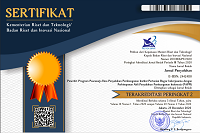Capacity Building of Ready to serve Fish Processor in Micro Enterprises for Business Continuity in Pringsewu District
Abstract
Fish processors in Pringsewu district are mostly engaged in micro-scale business. The problem faced by this micro-scale business is the fish processor capacity problem, such as the technical and managerial ability. This research aims to measure the processor capacity, the factors that affect the processor capacity and the effect of processor capacity on the business sustainability. This research was conducted in two fish processor centers, in Pringsewu and Pagelaran districts. Data collection was conducted in April 2018. Data were collected from all 75 fish processors. The data collected were analyzed using descriptive and inferential statistic, with Statistical Package for Social Science (SPSS) version 24 and Partial Least Square (PLS) 3 program. The results showed that processor capacity of fish in Pringsewu district was in a low category because they have not expert in technical and managerial skills yet. Three factors that affect the processor capacity is their individual characteristics, extension support, and external support. Individual characteristic factors are the level of formal and non-formal education. The extension support factors are intensity and extension methods. External support factor also of support from the government. Other results indicate that the processor capacity has a positive effect on the business sustainability. The higher the technical and managerial capacity of the processor, the business sustainability in the economic and environmental aspects will be increase.
Downloads
Authors who publish with this journal agree to the following terms:
- Authors retain copyright and grant the journal right of first publication with the work simultaneously licensed under a

This work is licensed under a Creative Commons Attribution 4.0 International License that allows others to share the work with an acknowledgement of the work's authorship and initial publication in this journal. - Authors are able to enter into separate, additional contractual arrangements for the non-exclusive distribution of the journal's published version of the work (e.g., post it to an institutional repository or publish it in a book), with an acknowledgement of its initial publication in this journal.
- Authors are permitted and encouraged to post their work online (e.g., in institutional repositories or on their website) prior to and during the submission process, as it can lead to productive exchanges, as well as earlier and greater citation of published work (See The Effect of Open Access).















